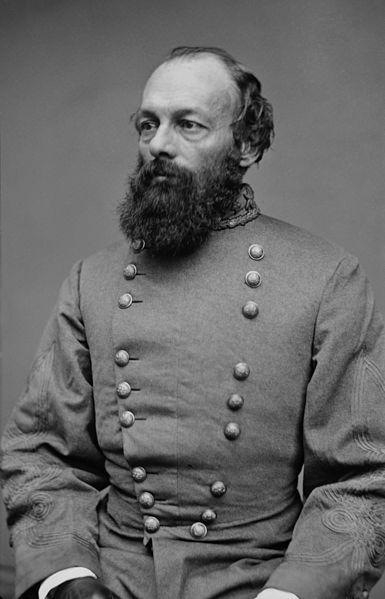 |
| General Edmund Kirby Smith |
HEADQUARTERS TRANS-MISSISSIPPI DEPARTMENT,
Arkadelphia, Ark., September 28, 1863.
His Excellency JEFFERSON DAVIS,
President:
SIR: Colonel R. W. Johnson goes to Richmond to lay before Your Excellency the condition of this department.* My previous communications must have convinced you they were eminently critical. Events, as they crowd upon us, are fast realizing my worst anticipations. The despondency of our people, their listlessness, their anticipations. The despondency of our people, their listlessness, their deafness to the call of both the civil and military authorities, the desertions from our ranks, checked neither by vigor nor clemency, all indicate despair and abandonment. Unless a great change takes place, unless succor comes to us from abroad, or unless the providence of God is strikingly exhibited in our favor, this department will soon have but a nominal existence. Without men, without arms, with a people so demoralized by speculation that submission is preferred to resistance the immense efforts being made by the enemy must be crowned with success.
The force at Little rock, under General Steele, numbers, from all estimates, at least 25,000. They have been re-enforced, and are only awaiting supplies before advancing. Desertions and sickness have reduced General Hulmes' command to less than 7,000. General Taylor has under 10,000 effective men in his district. He reports General Grant in person superintending operations at Berwick's Bay. Two entire corps of his army, supposed too be Ord's and McPherson's, with Banks' army, were encamped on the west shore. Texas was openly declared their destination. The large amount of transportation accumulated by them indicates a campaign by land from Berwick's Bay. Sherman's pickets extend to Bayou Macon. He has been preparing for active operations, and, it is reported, will march, by Monroe, on Shreveport or Camden. When these columns move, the enemy will bring fully 80,000 men to operate within the department. I shall concentrate as soon as their plans are developed; but, under the most favorable circumstances, cannot expect to bring over 15,000 effectives together. A decisive blow struck by us may turn the tide of events; but assistance from without or successes within the department can alone prevent the occupation of Arkansas, Louisiana, and the Texas coast this winter. Cut off as we are, I know not what aid you can give us. Arms and money are our most pressing wants, to pay the troops and meet the current expenses. Thelatter is immediately wanted. An officer of the Treasury should be sent with full powers. Bonds in large amounts and of small denominations should be sent. The redundant currency could be called in by loans on the people. This could be accomplished successfully with bonds, or interest-bearing certificate, made payable by Congress for Government dues. I do not hear from the Treasury Department, and know not if steps have been taken for supplying our wants. But for a letter from the honorable Secretary of War, stating that Mr. Memminger had or would provide for our necessities, I should ere this have taken the matter into my own hands. If I do not hear from Richmond, I will be compelled to establish here both a sub-bureau of the Treasury and Post-Office Department, and will have to raise a loan from the people on certificates, pledging the faith of the Government to redeem them in interest-paying bonds.
I would respectfully urge these matters upon the attention of Your Excellency.
With respect and esteem, I am, your most obedient servant,
E. KIRBY SMITH,
Lieutenant-General.
*See Smith to Johnson, October 2, p. 1029.
Official Records Vol. I., Series 22, Part 2, Page 1026.
War as a practical endeavor is not without costs. Kirby Smith was finding himself in the Trans-Mississippi a virtual king, but a king without treasure. His letter to Davis is a good testimony to the problems facing the Confederacy as the war moved late into its third year. Being physically cut off from Richmond he was as much emperor as general, given great latitude to manage the vast geographic area at his command. It become known as "the Kirby Smithdom".
No comments:
Post a Comment